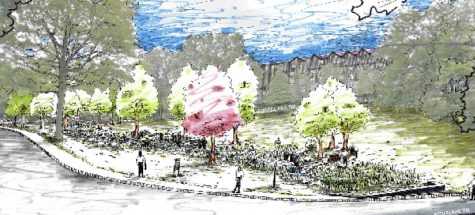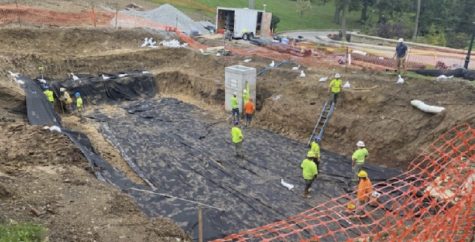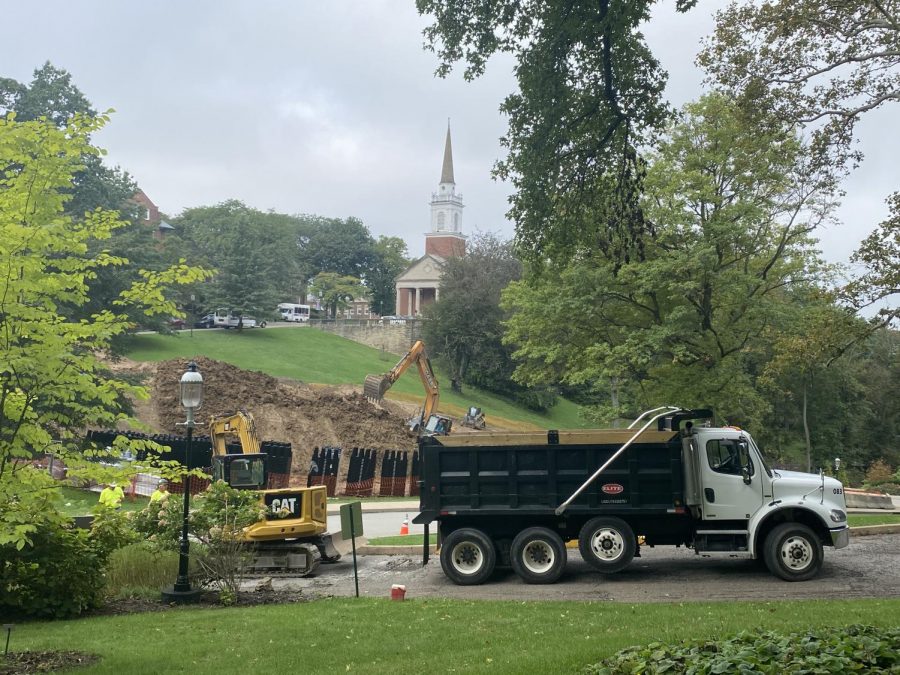Stormwater prevention project full of delays, disrupts students
Construction vehicles and equipment take up space on Chatham’s campus on Sept. 16. Roads that access various dorm buildings have had to temporarily close. Photo Credit: Lilly Kubit
September 22, 2021
Chapel Hill is under construction as the Pittsburgh Water & Sewage Authority (PWSA) builds a dry stream bed to slow and soak up stormwater on campus.
The Woodland Road Stormwater Project’s construction is currently 10% complete, according to the PWSA website. Chatham is hoping to finish the project by the end of November.
“That date is important because if we go past [November], then we can’t put landscaping in, so we’re really trying to get that done,” said Walter Fowler, Chatham University’s senior vice president for finance and administration and a lead contact for the project. “Bob DuBray, our head of facilities, and I really try to keep the pressure.”
Construction on the project began in late May, but innitial plans began in 2017. PWSA and Chatham experienced hold-ups due to surrounding neighbors needing to sign-off on the project, followed by last summer’s COVID-19 restrictions.
Other delays included product supply chain shortages and the discovery of unexpected underground conflicts caused by other pipes. Additionally, heavy rains have slowed progress.
Project contacts for PWSA, Elaine Hinrichs, education and outreach associate, and Ryan Quinn, the project manager, said things are moving toward the scheduled completion before this winter, with underground work expected to be complete by the end of October and all site work completed by December.
Impact beyond campus
The project is funded through an approximately $1 million grant from Allegheny County Sanitary Authority’s (ALCOSAN) GROW grant program. Chatham is contributing an additional $200,000 for landscaping and improvements to existing infrastructure on campus.

“The portion of the sewer system that ties in with this project area also serves many other city neighborhoods, including Shadyside, East Liberty, Bloomfield, Garfield and Polish Hill,” Hinrichs said.
Completion of the project will benefit stormwater runoff in the Chatham community and surrounding neighborhoods.
Rain water in Pittsburgh travels through the sewer system and flows into ALCOSAN, where it is treated with the city’s wastewater. If there is excess rain, ALCOSAN sends the excess water straight into the Ohio River. This results in diluted, untreated sewage flowing into the river.
Local rainfall patterns in Allegheny County have been more frequent and intense in recent years. The existing sewer system is not designed to manage the current levels of rainwater runoff, and properties in Shadyside have reported frequent basement backups during intense storms.
Ultimately, the stormwater managed on campus will help to mitigate these issues.
A plea for patience
However, construction has caused frequent road closures and inconveniences for students.

“The construction on Chapel Hill is just downright inconvenient. As someone who lives on campus, it disrupts me everyday,” Emi Perdan ‘24 said.
Driveways to multiple dorm buildings, such as Rea House and Beatty House, have been closed to accommodate construction.
“I have been woken up very early in the morning to the sounds of loud banging, metal clanking and machinery whirring,” Perdan continued.
Students can expect the construction to continue for the next couple months. In the meantime, Fowler asks that students please have patience.
Perdan admitted that “as much as the construction is inconvenient, the workers have been very polite in conversation.”
Even though construction will limit parking on the hill, Fowler said the new drainage system will not interrupt the tradition of sledding on Chapel Hill. The Chatham community should be able to sled this winter since construction will not interfere with the steepest part of the hill.








